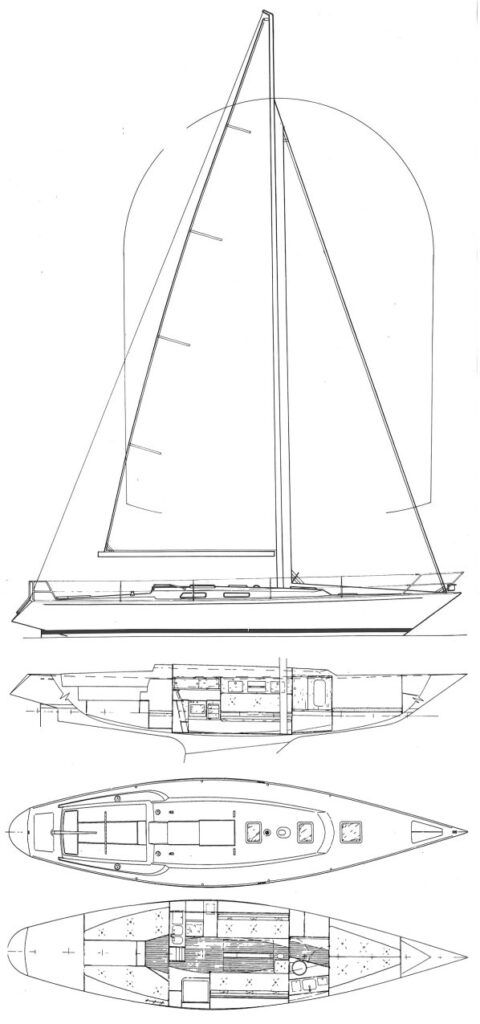The Omega 42, a distinguished sailing yacht, emerged from the design board of the legendary Swedish naval architect Peter Norlin in 1978. Built by Vindö, under their operating name Nötesunds Varv AB in Sweden, this monohull quickly carved out a reputation as a performance-oriented cruiser. Conceived during the height of the International Offshore Rule (IOR) era, Norlin's intention with the Omega 42 was to create a vessel "free from all rules," focusing instead on pure sailing enjoyment and balanced performance. Production of the Omega 42 continued until 1998, with approximately 160 units built.
Omega 42 Information, Review, Specs

- Make
- Model
- Number Built
- 160
- Production Year(s)
- 1978 - 1998
History and Design
The creation of the Omega 42 (Peter Norlin design #37) by the Swedish designer Peter Norlin marked a significant moment in performance yacht design. Norlin aimed to deliver a boat that excelled on the water without the constraints of racing rules, a philosophy that positioned the Omega 42 as a strong performer in regattas while still offering excellent cruising capabilities. During this period, Nötesunds Varv AB, the builder, was known for its commitment to exceptional craftsmanship and a distinctive aesthetic, particularly their signature mahogany superstructures, though the Omega 42 was constructed with a solid fiberglass hull and deck. The yard had notably transitioned to Glass Reinforced Plastic (GRP) around 1965, ensuring robust and durable construction for models like the Omega 42. While the core design remained consistent, later iterations of the Omega 42 featured slight interior layout changes, contributing to the observation that "no 42 is alike the next one," reflecting individual owner preferences or minor production adjustments.
Sailing Performance and Handling
The Omega 42 is characterized as a moderate-weight sailboat that delivers good performance and exceptional stability. With a Sail Area to Displacement ratio of approximately 19.42, she is well-powered, suggesting a lively performance in lighter winds while still capable of handling heavier conditions. Her high Ballast to Displacement ratio of around 0.506 points to a very stiff and stable boat, indicating excellent resistance to heeling and a robust righting capability. This inherent stability contributes to a comfortable motion in a seaway. The Displacement to Length ratio of approximately 206.1 places the Omega 42 in the moderate displacement category, indicating a balance between performance and cruising comfort, rather than an ultra-light racer or a heavy, traditional cruiser. Owners and reviewers often praise the Omega 42 for its absolute stability and easy handling, making it a reliable and enjoyable vessel across various sailing conditions.
Accommodations and Layout
The interior of the Omega 42, while designed in the 1970s, reflects a classic layout with a focus on functionality, though later iterations introduced minor updates. The general arrangement typically includes a fore cabin with a closed-off bathroom in the bow section. While specific details vary between individual boats, the core layout generally incorporates a salon, galley, and sleeping berths, suitable for coastal and offshore cruising. Given Vindö's reputation, established by Carl Andersson and continued under his son Karl-Erik, the interior finish would likely feature quality materials, possibly including the attractive wood trim, such as teak and mahogany, characteristic of Vindö yachts, prioritizing quality, style, and comfort. The design aimed for a timeless appeal, maintaining much of its original internal layout without significant concessions to modern trends.
Owner's Perspectives
Owners of the Omega 42 frequently express strong admiration for Peter Norlin's design, often referring to it as an "outstanding" and "awe-inspiring" vessel. The boat's sailing capabilities, particularly its stability and performance, are consistently highlighted as strengths. While there is no indication of widespread, recurring manufacturing defects or common problems across the fleet (excluding general wear and tear typical of boats of its age), the individualized nature of some interiors means that each Omega 42 might offer a unique living space, often customized by owners. This adaptability, coupled with the boat's solid construction and sailing characteristics, contributes to a dedicated community of owners who appreciate the Omega 42's classic lines and robust build.
Measurements
Construction & Hull
- Construction Material
- Fiberglass (Solid)
- Hull Type
- Monohull Sailboat
- Keel Type
- Fin
- Rudder
- 1x Spade
- Ballast
- 8267 lbs (Lead)
- Displacement
- 16314 lbs
- Water Capacity
- -
- Fuel Capacity
- -
Engine
- Engine Make
- Yanmar
- Engine Model
- —
- Engine Type
- —
- Engine HP
- —
- Engine Count
- 1
- Drive Type
- —
- Fuel Type
- Diesel
Rig & Sails
- Rig Type
- Fractional Sloop
- P (Main Luff)
- 50.85 ft
- E (Main Foot)
- 16.4 ft
- I (Foretriangle Height)
- 47.24 ft
- J (Foretriangle Base)
- 15.42 ft
- Forestay Length (est)
- 49.69 ft
- Main Sail Area
- 416.97 sqft
- Foretriangle Sail Area
- 364.22 sqft
- Total Sail Area (Reported)
- 779 sqft
- Total Sail Area (Calc)
- 781.19 sqft
Dimensions
- LOA
- 41.99 ft
- LWL
- 32.81 ft
- Beam
- 10.17 ft
- Draft
- 5.48 ft
- Max Headroom
- -
- Air Draft
- -
Calculations
- Hull Speed
- 7.68 kn
- Pounds per Inch Immersion
- 1